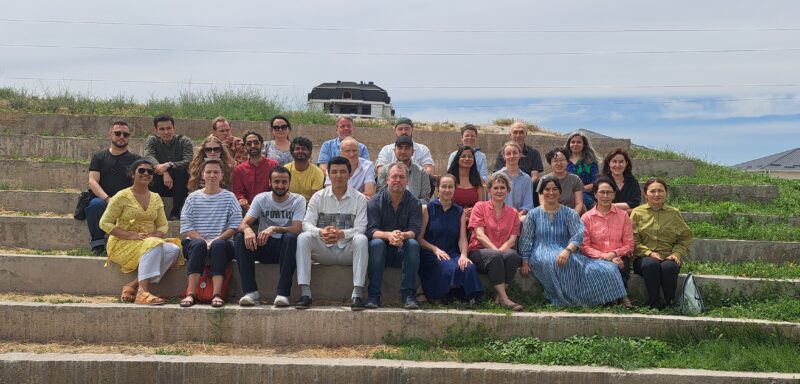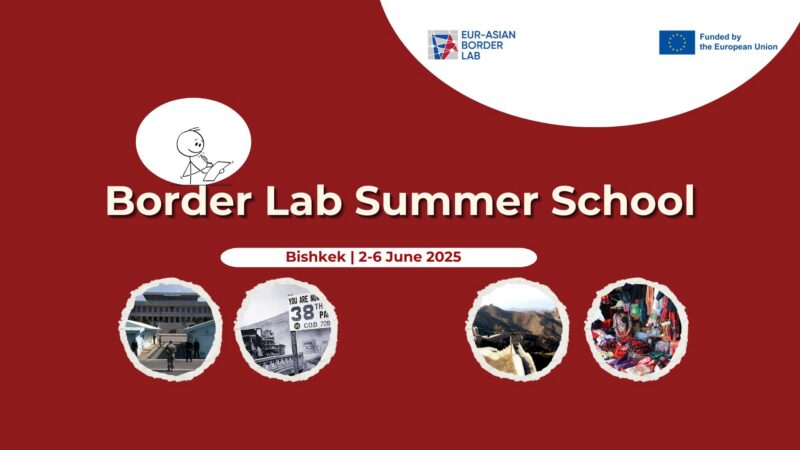
Important: please note that this event took place from 2-6 June, 2025
Post-event reflection (Core team) Participant spotlight (Claire)
Photo essay (Yaxuan, Archana, & Otabek)
The Border Lab Summer School officially begins this week in Bishkek, Kyrgyzstan, a vibrant setting for a week-long deep dive into the evolving dynamics of borders, mobility, and territoriality.
In collaboration with the American University of Central Asia (AUCA), this year’s Summer School brings together an exceptional group of early career researchers and scholars working across social sciences, humanities, and adjacent disciplines. The goal: to test and rethink border concepts in motion – conceptually, regionally, and methodologically.
A global cohort, A shared focus
With over 600 applications received from around the world, the selected participants form a richly diverse and interdisciplinary cohort. Representing institutions such as the University of Oxford, Koç University, the National University of Singapore, the Estonian Academy of Arts, the Indian Institute of Technology Mandi, and the University of Eastern Finland, the group includes doctoral researchers, practitioners, and early-career scholars working across anthropology, law, international relations, development studies, visual culture, environmental governance, and migration.
Together, they bring perspectives from Europe, Central and South Asia, East Asia, and beyond, fostering conversations that cut across geography, method, and disciplinary boundaries. Hence, the program is designed to foster comparative and collaborative approaches to border research through a blend of:
- Lectures by leading scholars
- Field visits to local sites of border relevance
- Small-group workshops focused on research-in-progress
- Interactive sessions on theory, method, and regional insights
Speakers include internationally recognised experts in border and mobility studies:
Shairbek Dzhuraev
Shairbek Dzhuraev is the co-founder and president of Crossroads Central Asia and a visiting lecturer at the OSCE Academy in Bishkek. With extensive experience in research consultancy, he has worked with the UN, EU, USAID, and other international bodies. His research focuses on Central Asia’s international relations, foreign policy, and water-energy politics. He previously held academic leadership roles at the OSCE Academy and the American University of Central Asia. Shairbek holds a PhD in International Relations from the University of St Andrews and an MSc from LSE.
Willem van Schendel
Willem van Schendel is Professor of Modern Asian History at the University of Amsterdam and a senior researcher at the International Institute of Social History. His work spans history and anthropology, with research interests in borderlands, labour history, more-than-human relations, and visual archives. He has written extensively on South and Southeast Asia, especially Bangladesh and the Eastern Himalayas. Willem co-edits the Asian Borderlands book series for Amsterdam University Press and has published key works on border studies, including Entangled Lives and The Bengal Borderland.
Asel Murzakulova
Asel Murzakulova is a Senior Research Fellow with the University of Central Asia’s Mountain Societies Research Institute and Co-Founder of the analytical club “Mongu.” She has extensive experience working with governmental, international, and civil society organizations across Central Asia, where her expertise has contributed to research and policy development on issues such as conflicts, migration, natural resource management, (in)security, hydro politics and community adaptation to climate change.
Zalina Enikeeva
Zalina Enikeeva is a Research Fellow at the Institute of Public Policy and Administration, University of Central Asia. She has extensive collaboration experience with the Institute of Trade Policy of the Higher School of Economics (HSE), World Bank (WB), German Society for International Cooperation (GIZ), United Nations Economic and Social Commission for Asia and the Pacific (UNESCAP), etc. in conducting research. Her expertise includes integration of the Eurasian Economic Union (EAEU), Belt and Road Initiative (BRI), international trade, food security and tourism.
Nick Megoran
Nick Megoran is a political geographer and professor at Newcastle University. His research explores post-Cold War geopolitics, with a focus on Central Asia’s border disputes, nation-building, and the politics of peace. He also examines the intersections of religion, memory, and conflict, and is engaged in critical debates on academic freedom, workplace ethics, and the role of universities in public life. Nick is completing a book on violent borders and co-founded The Analogue University collective. He serves on the editorial board of Central Asian Survey.
Paul Fryer
Paul Fryer is a University Lecturer and Docent in Human Geography at the University of Helsinki. His research explores labour migration from Central Asia to Russia, focusing on the social, economic, and political dynamics shaping migrants’ experiences. He also investigates changing perceptions and contested meanings of the Tajik-Kyrgyz border in the Pamir Mountains. His work contributes to broader debates on mobility, borders, and regional identity in Central Asia.
Emil Nasritdinov
Emil Nasritdinov is an Associate Professor in the Liberal Arts and Sciences department at the American University of Central Asia (AUCA). Emil combines architectural training and anthropology to study urban life through technical and ethnographic approaches. He co-founded the Social Innovations Lab Kyrgyzstan and is chief editor of Ketmen: International Journal for Central Asian Voices. His research focuses on migration, religion, and urbanism, including street youth culture, green spaces, and residential neighborhoods. Emil has received fellowships including a Fulbright Research Scholarship at George Washington University and is active in regional research centers.
Asides from external speakers, the Eur-Asian Border Lab’s core team and researchers are on-ground to share insights and mentor the participants.
Themes and goals
The Summer School offers a unique opportunity to explore how border concepts travel, transform, and take root in different contexts, particularly across Europe and Asia. Participants will examine how borders are shaped not just by politics and policy, but by social practices, histories, infrastructures, and lived experience.
Whether discussing surveillance and migration, environmental frontiers, or symbolic boundaries, the week aims to push the conversation forward, both intellectually and collaboratively.
You can download the programme here: Download PDF
Testimonial (Elisa Sisto)
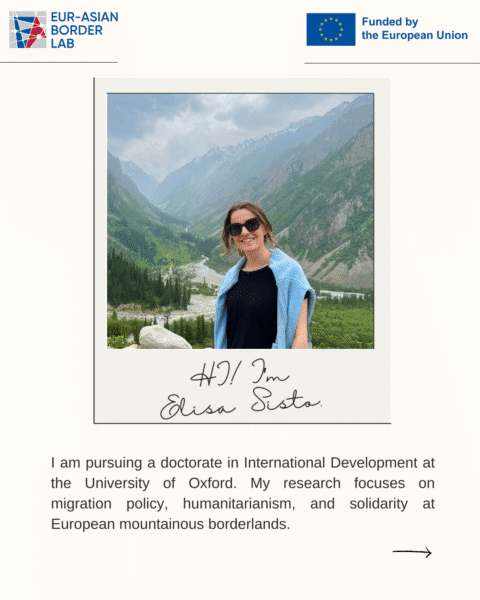 |
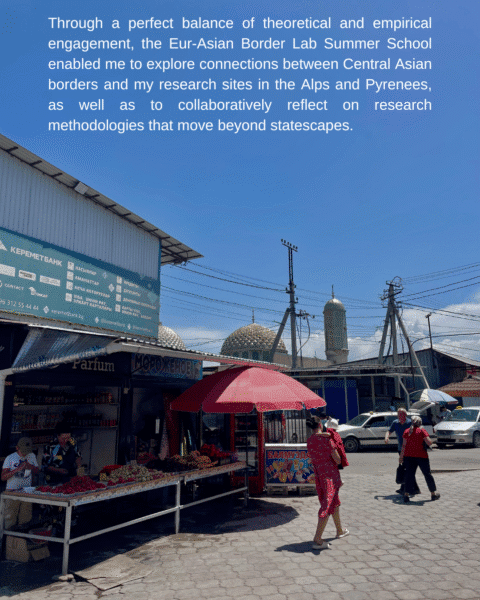 |
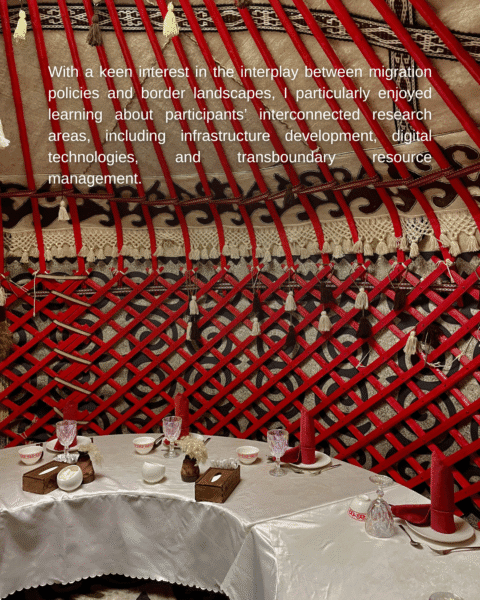 |
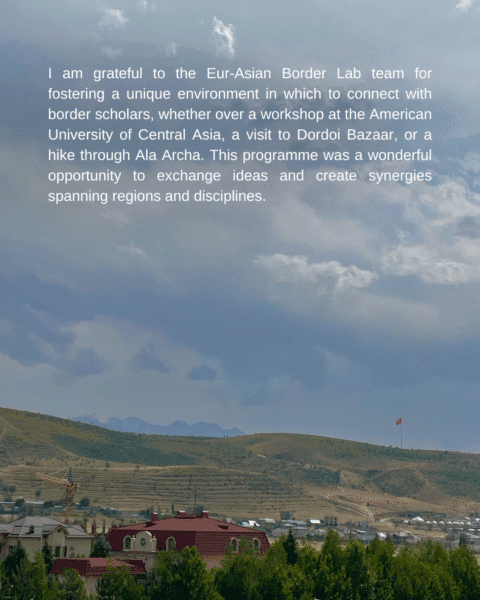 |
Border Lab Summer School 2025 Cohort
